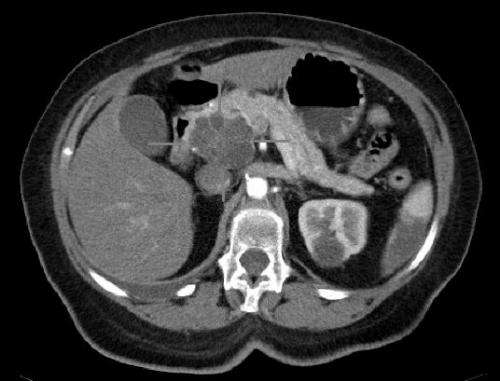Study' preliminary results show response of 32% in treatment of pancreatic tumors

Working with an international team of researchers, HonorHealth Research Institute and the Translational Genomics Research Institute (TGen), an affiliate of City of Hope, were instrumental in one of the first clinical trials showing how pancreatic cancer patients can benefit from immunotherapy, according to a four-year study published in a premier scientific journal, Nature Medicine.
The "COMBAT trial" (NCT02826486) is a prospective, open label, phase IIa clinical trial for patients with metastatic pancreatic cancer, meaning their cancer had spread to other parts of the body. Patients were given pembrolizumab, an immune therapy drug, in combination with BL-8040, an agent that makes the tumor microenvironment more receptive to immune therapy.
The study was conducted in Arizona at the HonorHealth Research Institute and at 30 other locations in the U.S. and across the globe, including Spain, Israel and South Korea.
The two-part clinical trial began in September 2016:
- Cohort 1, a group of 37 patients whose cancer had already progressed on other therapies, were treated with pembrolizumab and BL-8040. Importantly, it appeared this combination therapy made pancreatic cancer more "hot," meaning it could work in tandem with the body's own immune system. Previous studies have shown pancreatic tumors to be "cold," meaning immune therapies like pembrolizumab were not able to act on the cancer.
- Preliminary results of Cohort 2 were reported in the manuscript on a group of 22 patients (out of approximately 40 patients in total expected in the cohort), who had previously received one line of chemotherapy. These patients received pembrolizumab and BL-8040, as well as chemotherapy drugs 5-fluorouracil and nano-liposomal irinotecan.
"The percentage of meaningful tumor shrinkage was 32% in Cohort 2, which is double what is available for individuals with pancreatic cancer with traditional chemotherapy. While the study is small, these preliminary results are encouraging and there is hope that we will be able to do larger trials to see if the response to therapy is high and if it is better in comparison to traditional treatment," said Erkut Borazanci, M.D., M.S., a medical oncologist and physician-investigator at HonorHealth Research Institute, a clinical associate professor at TGen, and one of the paper's authors.
This clinical trial is currently in a follow-up phase of the study.
Pancreatic cancer is an aggressive disease that carries a high mortality rate. It is the third-leading cause of cancer death in the U.S., following lung and colorectal cancers. In 2020, the five-year survival rate for pancreatic cancer is 10%, which has increased from 6% in 2014.
Next steps for this research would be to compare this COMBAT combination therapy in future studies to other treatment options, such 5-fluorouracil, leucovorin and nano-liposomal irinotecan.
COMBAT derives its name from letters in one of the study's descriptions: Combination of BL-8040 and Pembrolizumab in Patients with Metastatic Pancreatic Cancer.
More information: Bruno Bockorny et al, BL-8040, a CXCR4 antagonist, in combination with pembrolizumab and chemotherapy for pancreatic cancer: the COMBAT trial, Nature Medicine (2020). DOI: 10.1038/s41591-020-0880-x















